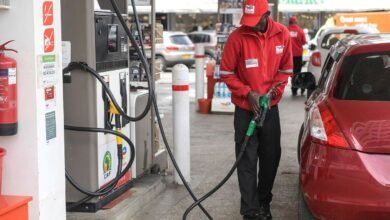
Kenyans are staring at high fuel prices as the Energy and Petroleum Regulatory Authority(EPRA) moves to review this month’s prices, expected to come out on Thursday.
This is after oil Price Jumped above Ksh.8,860.04 (US$.80) and natural gas raced higher, turbocharged by supply shortages.
On Friday, global prices where oil rose record high, gaining about four percent on the week, as a global energy crunch boosted U.S. prices to their highest in almost seven years.
Brent crude was up Ksh. 165.01 or 1.8 percent, at Ksh. 9,192.33 (US$.83.88) a barrel, after hitting its highest since October 2018 at Ksh. 9,369.41 (US$.84.60) earlier in the session.
According to Reuters, the pace of economic recovery from the pandemic, combined with cold weather have supercharged energy demand, coming at a time when pressure on governments to accelerate the transition to cleaner energy has slowed investment in oil projects.
A U.S. administration official on Monday said the White House stands by its calls for oil-producing countries to “do more” to support the global economic recovery and they are closely monitoring the cost of oil and gasoline. read more
The Organization of the Petroleum Exporting Countries and allies, together known as OPEC+, have held back from boosting supply even as prices have risen.
Big power users have been struggling to meet demand.
Mid-last month, fuel prices in Kenya hit a historic high after prices of petrol, diesel and kerosene increased by Ksh.7.58, Ksh.7.94 and Ksh.12.97, respectively.
This saw a litre of the above listed commodities retail at Ksh.134.72, Ksh.115.60, and Ksh.110.82 per litre respectively, in Nairobi.
It was coupled with higher taxes which has accounted for higher cost of living in the country, ven as government officials led by Interior CS Dr. Fred Matiangi promising a downward revision of fuel prices expected to be released this Thursday by EPRA.
Taxes in fuel prices include excise duty which takes the lion’s share of Ksh.21.95 of every litre of petrol followed by the Road Maintenance Levy (Ksh.18).
Value Added Tax (VAT) has been adjusted upwards to Ksh.9.98 while the Petroleum Development levy is charged at Ksh.5.40.
Other levies included in the fuel pricing are Petroleum Regulatory Levy, Railway Development Levy, Anti-adulteration Levy, Merchant Shipping Levy and the Import Declaration Fee.
Kenya has the most expensive pump prices in the region.
High fuel prices have affected the cost of living in the country, where inflation has been rising since April, hitting an 18-month high of 6.91 in August.
Manufacturers and transporters have warned of a jump in the cost of goods and services as they move to pass the high operational costs, occasioned by the fuel price jump, to the consumers.
Agricultural products are also expected to become costlier as diesel is a key input in production, mainly in large scale farming where machinery is used.
CS Matiangi said they are chasing time to implement President Uhuru Kenyatta’s order to reduce the cost of power by December 31, 2021.
“Work has started now to ensure we reduce the cost of power, We were given 90 days, we have begun that task today. Our bills are too high. Effective now we have suspended any negotiations on any new Power Purchase Agreements” said Matiangi.
The cost of reduction will be achieved through the reduction of the consumer tariffs from an average of Ksh.24 per kilowatt-hour to Ksh.16.
Also Read:
- EPRA points accusing finger on Parliament over perennial hiked fuel cost
- Kenyans to enjoy cheaper electricity starting December
- Fuel prices to go down in next review
The National Treasury, the Ministry of Energy and Parliament are the state agencies that can influence the price of fuel in the country.
This is according to Energy and Petroleum Regulatory Authority (EPRA) Director-General Daniel Kiptoo who told National Assembly Committee on Finance and National Planning that the regulator had no powers to reduce fuel prices, since it tabulates the pricing using a formula approved by Parliament and National Treasury.
Kiptoo further said EPRA did not subsidize fuel this month because the National Treasury did not approve use of Fuel Stabilization Fund, which it often taps to cushion consumers.
On September 28, Kiptoo told the National Assembly Committee on Finance and National Planning that the Fuel Stabilization Fund had been used in the last four months.
However, the last review on September 14, 2021, resources from the fund were not utilized leading to increases in kerosene, super petrol and diesel by Ksh.12.97, Ksh.7.54 and Ksh.7.94 per litre respectively, leading to public outcry.
Kiptoo said Ksh.8.7 billion from the fuel stabilization kitty had so far been spent on subsidizing fuel prices.
When legislators questioned the taxes and levies on fuel, Kiptoo said the answers lied with the legislators, the National Treasury and the Ministry of Energy who can set or revise the components of the fuel pricing formula.
The National Assembly Speaker Justin Muturi directed the standing Committee on Finance and National Planning to table a report on the fuel price increase by EPRA within 14 days due to its urgency and effects it has on Kenyans.
The committee is also required to attach a draft bill to the report for any approval for publication proposing legislative intervention to the House.





